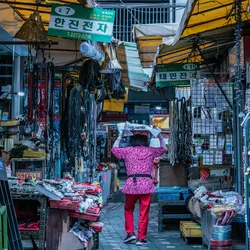
Level 1:
In South Korea, some people feel lonely because they don’t see their friends or family often. The government wants to help these people. They made a program called the “Lonely Senior Allowance” for older people who live alone. If they qualify, they get money each month to help them pay for things. The government also made a similar program called the “Lonely Youth Allowance” for younger people. This program helps younger people who don’t make much money and live alone. By giving them money, the government hopes these people can take part in activities and meet others. Even though some people don’t think it’s enough, the programs are helping many people.
Level 2:
Social isolation and loneliness are becoming more common in South Korea. Nearly half of all Koreans aged 65 and older live alone, and young people are feeling isolated too. To help, the government started two programs. The first program is for people who are 65 or older and live alone. It’s called the “Lonely Senior Allowance.” If someone qualifies, they get money each month to help them pay for things. They can even get extra money if they do activities like volunteering. The second program is for younger people. It’s called the “Lonely Youth Allowance.” Younger people who don’t make much money and live alone can get up to $270 USD per month. Some people say the programs don’t fix everything, but they’re a start.
Full Story:
South Korea has been dealing with an increasing problem of social isolation and loneliness in recent years. According to a 2018 Ministry of Health and Welfare poll, nearly half of all Koreans aged 65 and older live alone, with an increasing proportion of young individuals experiencing feelings of loneliness as well.
To address this issue, the South Korean government established the “Lonely Senior Allowance.” This program provides a monthly allowance of 100,000 won (about $90 USD) to qualifying adults who are 65 or older and live alone. Those who participate in community activities such as volunteering or taking lessons can also receive an additional 30,000 won (about $27 USD) per month.
However, the program has lately expanded to accommodate younger people. In 2020, the government implemented the “Lonely Youth Allowance,” which gives financial assistance to those aged 19 to 34 who live alone and have low earnings. Depending on the applicant’s financial status, the stipend can be worth up to 300,000 won (about $270 USD) per month.
The purpose of these allowances is to encourage socially isolated individuals to leave their houses and interact with others in their communities. The government intends to reduce some of the financial burden that may prohibit people from participating in social activities by giving financial assistance.
Critics contend that the approach just addresses the symptoms of social isolation and does not address the underlying reasons. Some argue that the high cost of living in places such as Seoul makes it difficult for young people to purchase accommodation, leading to increasing rates of living alone. Others claim that the country’s work ethic, which values long hours and productivity, contributes to feelings of isolation and loneliness.
Despite these concerns, the program has gained considerable governmental and corporate sector support. Many businesses have made steps to support the program, such as providing discounts to those who get allowances. Local community centers have also been developed to facilitate social interaction and activities.
It is crucial to remember that South Korea is not the only country dealing with loneliness and social isolation. Countries all throughout the world are dealing with comparable issues, particularly in the aftermath of the COVID-19 pandemic. The government of the United Kingdom, for example, has developed a “Loneliness Strategy” focused at reducing social isolation among elderly persons. Similarly, Japan has developed a program known as “Fureai Kippu,” which allows people to earn credits by caring for or accompanying older people in their communities.
Overall, while the South Korean government’s policy may not address all of the underlying causes of social isolation and loneliness, it is a start in the right direction. The initiative provides a lifeline to persons who may otherwise feel isolated from their communities by providing financial support and encouraging community engagement. Programs like these will become increasingly crucial in encouraging social cohesiveness and well-being as we continue to manage the problems of an increasingly connected yet separated society.
Questions:
What is the purpose of the “Lonely Senior Allowance” program?
What is the age requirement for the “Lonely Youth Allowance” program?
How much money can a person receive each month from the “Lonely Senior Allowance” program?
Do you think the government’s programs are enough to address the issue of social isolation and loneliness in South Korea? Why or why not?
What are some other countries that have developed similar programs to address social isolation and loneliness?
Fill in the Blanks:
productivity, loneliness, Allowance, accommodate, Loneliness, qualifying, lifeline, Critics, allowance, separated, underlying, stipend, discounts, poll, connected
South Korea has been dealing with an increasing problem of social isolation and ________ in recent years.
According to a 2018 Ministry of Health and Welfare ________, nearly half of all Koreans aged 65 and older live alone, with an increasing proportion of young individuals experiencing feelings of loneliness as well.
To address this issue, the South Korean government established the “Lonely Senior ________.” This program provides a monthly ________ of 100,000 won (about $90 USD) to ________ adults who are 65 or older and live alone.
However, the program has lately expanded to ________ younger people.
Depending on the applicant’s financial status, the ________ can be worth up to 300,000 won (about $270 USD) per month.
________ contend that the approach just addresses the symptoms of social isolation and does not address the ________ reasons.
Others claim that the country’s work ethic, which values long hours and ________, contributes to feelings of isolation and loneliness.
Many businesses have made steps to support the program, such as providing ________ to those who get allowances.
The government of the United Kingdom, for example, has developed a ”________ Strategy” focused at reducing social isolation among elderly persons.
The initiative provides a ________ to persons who may otherwise feel isolated from their communities by providing financial support and encouraging community engagement.
Programs like these will become increasingly crucial in encouraging social cohesiveness and well-being as we continue to manage the problems of an increasingly ________ yet ________ society.
Vocabulary:
Social isolation - the state of being separated from others and lacking social interaction
Loneliness - the feeling of being alone and disconnected from others
Ministry of Health and Welfare - a government agency responsible for public health policies in South Korea
Poll - a survey used to collect information or opinions from a group of people
Allowance - a sum of money given regularly, typically to cover expenses
Qualifying - meeting the requirements for a particular program or benefit
Stipend - a fixed regular sum paid as a salary or allowance
Accommodate - to provide housing or support
Critics - people who express their disapproval or objections towards something
Underlying - the basic or fundamental cause of something
Work ethic - a set of values that emphasizes the importance of hard work and productivity
Productivity - the rate at which goods or services are produced
Corporate sector - businesses and companies collectively
Discounts - a reduction in the price of goods or services
Community centers - facilities designed to provide a space for community activities and events
Lifeline - a source of help or support during difficult times
Social cohesiveness - the degree of unity and connectedness within a society
Well-being - the state of being healthy, happy, and content
Connected - having links or relationships with others
Separated - isolated or disconnected from others




